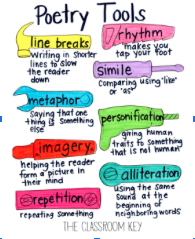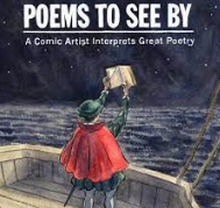As a reader of my column, you know by now I am obsessed with reading graphic novels and finding ways to connect comics to the classroom. What you might not know is that I set my alarm extra early every morning so I have time to write and read poetry. I am a person who is moved by the power of language. Since middle school, I have been writing and reading poetry, attending workshops, teaching poetry in my children’s schools, and, as a teacher librarian, working to connect students to poetry all throughout the school year. As I write this article we are in the waning days of National Poetry Month and I want to turn your attention to the convergence of poetry and comics.
In a poem, lines might form and fill a stanza, which literally means “room”; and so it is with comics, where panels could likewise be thought of as stanzas. Rows, columns, and/or stair-steps of panels, in turn, structure a page (or an entire story) of comics and give it its particular cadence. Even the simplest grid tattoos its rhythmic structure onto the page.

Let’s think for a moment about poetic devices: rhyme, rhythm, meter, enjambment, allegory, metaphor, consonance, assonance, euphony, cacophony. Comics offer a fascinating space to explore these devices in the typical poetic manner, but also in fresh, exciting ways by using visual expression. For instance, using images and words to show allegory or to express consonance. The language and color in a comic can create rhythm or cacophony. Comic artists also use the panel frames, speech bubbles, and the gutter to emphasize the poem’s shape, flow, sound, and meaning.

- use the adapted form in tandem with the original poem to help students understand the original,
- model interpreting poetry,
- create your own comic adaptation,
- support emerging English language learners’ acquisition and understanding, or
- prompt poetry writing with comics.
Another highlight is Chrissy Williams, who is based in Britain. Williams is the author of Over the Line: an Introduction to Poetry Comics (2015), the first anthology of its kind that brings artists and poets together to create poetry comics. Williams has taught and collaborated with Poetry School, Poetry Society, and Poetry Library in Britain. She met with comic artists and poets in a pub for years every month to collaborate on poetry comics. While I encourage you to read her book, she published this fantastic poetry/comics digital booklet that can be used with students to create poetry comics.
Poetry comics is not new but still a narrow field within the world of comics. Not much of the current conversation is geared toward the K-12 crowd, especially the pre-sixth grade students. Yet I see an opportunity, some excitement around the possibilities of poetry comics and its connections to these students. By interpreting or creating poems, or developing an elasticity with language play through this combined medium, I hope it spurs excitement with your students. If this topic fascinates you as much as it does me, please do not hesitate to reach out to me to keep the conversation going.
Poetry Comics Book List
Craghead III, W. How to Be Everywhere. Poetry by Guillaume Apollinaire. 2007.
Duffy, Chris. Editor. Above the Dreamless Dead: World War I in Poetry and Comics. First Second 2014.
Ginsberg, Allen. Howl: A Graphic Novel. illus. by Eric Drooker. 224p. HarperPerennial. 2010.
HInds, Gareth. Beowulf. Candlewick. 2007.
Hinds, Gareth. The Iliad. Candlewick. 2019.
Hinds, Gareth. The Odyssey. Candlewick. 2010.
Hinds, Gareth. Poe: Stories and Poems, A Graphic Novel Adaptation. Candlewick 2017.
Lorca, Garcia Frederico. Canciones. Illustrated by Tobias Tak. NBM Graphic Novels. 2021.
Peters, Julian. Poems to See By: A Comic Artist Interprets Great Poetry. Plough Publishing House. 2020.
Poe, Edgar Allen. Gahan Wilson, Illustrator. The Raven and Other Poems by Edgar Allen Poe. Classics Illustrated. Papercutz. #4. 2009.
Further Reading Suggestions
Einspruch, Franklin. Ed. Comics as Poetry. foreword by William Corbett ; contributors: Kimball Anderson, Derik A. Badman, Warren Craghead, Julie Delporte, Oliver East, Franklin Einspruch, Jason Overby and Paul K. Tunis.New Modern Press. 2012.
Mullins, Nick. The Lost Cause of Poetry. Nijomu. 2019 (self published)
Valentine, Ryan M. Poetry Comix. Source Point Press. 2019.
Linthout, Theo and Willy Linthout. Years of the Elephant; translation, Michiel Horn ; poetry by Theo Linthout translated by Serge Baeken. Ponent Mon. 2009.
Goldstein, Bobbye S., Mother Goose on the Loose. illustrated with cartoons from The New Yorker. Harry N. Abrams Inc. 2003.
Badman, Derik. Comics Poetry, Poetry Comics, Graphic Poems. Hooded Utilitarian. August 20, 2021. https://www.hoodedutilitarian.com/2012/08/comics-poetry-poetry-comics-graphic-poems/
Bennett, Tamryn and Guillermo Batiz. Comics Poetry: Praxis and Pedagogy. Image Text. Volume 7, Issue 3: Comics and Pedagogy. University of Florida. 2022. https://imagetextjournal.com/comics-poetry-praxis-and-pedagogy/
Brunetti, Ivan. Comics as Poetry. The Paris Review. Jan 30, 2020. https://www.theparisreview.org/blog/2020/01/30/comics-as-poetry/
Kersulov, M. L., & Henze, A. (2021). Where image and text meet identity: Gifted students’ poetry comics and the crafting of “nerd identities”. Journal of Media Literacy Education, 13(1), 92-105. https://doi.org/10.23860/JMLE-2021-13-1-8
Labarre, Nicolas. Poetry in Comics, Poetry Comics. Universite Bordeaux Montaigne. Ffhal-03367640f. https://hal.archives-ouvertes.fr/hal-03367640/document
Mastricolo, Patricia. Poetry is Everywhere! Poetry Comics. Comic Book Legal Defense Fund. April 2020. http://cbldf.org/2020/04/poetry-comics/
Nichols, Elizabeth Gackstetter. "A Discovery of Visual Poetry: Reading UNM's Collection of Mexican and Chilean Comics and Zines." (2022). https://digitalrepository.unm.edu/laii_events/107
Parker, John. R. Comics and Poetry: The Rhyme and Rhythm of Sequential Art. May 2011. https://comicsalliance.com/comic-books-poetry/
Robertson, D 2015 Justification of Poetry Comics: A Multimodal Theory of an Improbable Genre. The Comics Grid: Journal of Comics Scholarship, 5(1): 9, pp. 1–6, DOI: http://dx.doi.org/10.5334/cg.bg Published: 07 August 2015 Copyright: © 2015



